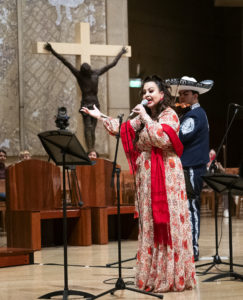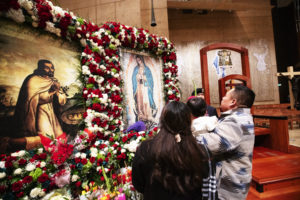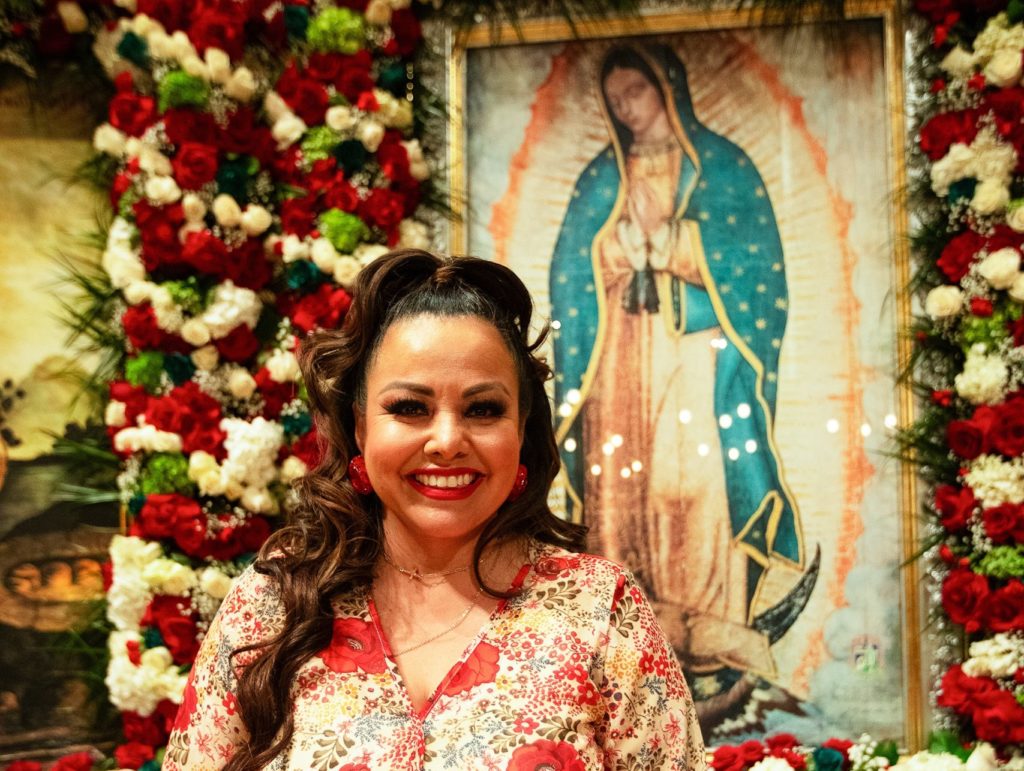Five years ago, Rosy Oros lay comatose in a hospital bed in Mexico — some 1,500 miles away from home — after experiencing complications from a medical procedure that had taken a drastic toll on her body and mind.
She was suffering internal and external bleeding, her organs were damaged, and doctors gave her only a 2% chance of surviving.
As she lay there on the brink of death, she finally opened her eyes and — in a haze — saw a familiar set of brown eyes gazing back at her, lovingly, that were very much still alive.
Those eyes belonged to an image of Our Lady of Guadalupe hanging just a few feet away, at once filling her heart with love and hope that the Virgin Mary she’d held dear since childhood would intercede with Jesus to help her make it out of the clinic alive.
Oros’ healing journey came full circle this month as she and a cadre of other musicians sang hymns of praise and thanksgiving to Our Lady of Guadalupe during the annual “Las Mañanitas” celebration at the Cathedral of Our Lady of the Angels in honor of her feast day.
“I am so humbled and blessed to be able to stand there and in my own simple way give thanks to the Virgin,” Oros said. “It may seem insignificant but I know that she is receiving it with a lot of love and that it makes her happy, because she knows my heart.”

At the Cathedral of Our Lady of the Angels, the festivities ran from the evening of Dec. 11 into the early hours of Guadalupe’s feast day, Dec. 12.
As in years past, the celebration featured Aztec and Ballet Folklorico dancers, veneration of the only relic of St. Juan Diego’s “tilma” in the U.S., the rosary, a musical tribute that included “Las Mañanitas,” and ended with midnight Mass, where Archbishop José H. Gomez said the Guadalupe story is a reminder that “Jesus Christ loves us so much that he came to share our hopes and dreams and to offer his life for us.”
“Just as she did with Juan Diego, the most holy Mary entrusts each of us with a task. She has a message that she needs us to spread and she is sending us to tell the whole world about Jesus and his love and salvation.”
Oros aimed to do just that as she and six other guest singers — including Latin Grammy-nominated Graciela Beltran — delivered individual serenades to the Virgin backed by Mariachi Garibaldi de Jaime Cuellar.
Oros — dressed in a floor-length gown and red shawl — carefully made her way onto the altar, set down a bouquet of red roses near two giant images of Our Lady of Guadalupe and St. Juan Diego bedecked with hundreds of flowers, and sang two songs to the Virgin while looking deep into the compassionate eyes that she’s come to know so well.
It was a moment that she had trained for all her life.
Oros was born in Aguascalientes, Mexico, into a family of nine that is both musically inclined and devoutly Catholic; one of her brothers spent six years in the seminary, while another is currently a Jesuit novice. She immigrated to Santa Maria in California as a preteen, and from a young age studied music theory and vocalization, singing to God and to Our Lady of Guadalupe.
At 12, she discovered a love for Mexican “ranchera” music when her father bought her a copy of Linda Ronstadt’s 1987 album, “Canciones De Mi Padre” — in which the American singer recorded traditional mariachi songs that were of special significance to her family.
“I would lock myself in my room and listen to the cassette over and over and over again until I learned all the songs,” she said. “I fell in love with Linda Ronstadt, with her voice, with her interpretation.”
Since then, Oros has remained close to the singing world. She’s enjoyed a long career working in TV, radio, the recording industry, and now in publishing as editor-in-chief of Iconos, her own magazine highlighting music and entertainment news.
While she’s remained mostly behind the scenes, she has recorded jingles, produced her own albums, and sings when the occasion arises. While living in New York, she had the chance to sing on the “Late Show with David Letterman,” for fashion designer Oscar de la Renta, and open for Mexican “ranchera” icon Vicente Fernández at Madison Square Garden.
“Even though I liked to sing, for some reason, I felt like God didn’t want me to become a famous singer and I understood that and I accepted it with much love and humility,” Oros said. “And so now when there is an opportunity for me to sing or participate in a festival or a special event, I do it.”
It was with that sense of humility that Oros accepted the chance to sing during this year’s “Mañanitas” celebration at the cathedral, out of gratitude for the role she said Our Lady played in saving her life just five years ago.
In 2018, Oros went into septic shock, and then fell into a coma, after undergoing a medical procedure in Aguascalientes. After awakening, she suffered a cerebral thrombosis and other complications that worsened her prognosis.
Drifting in and out of consciousness, she spent the early days of her recovery in a clinic named, aptly, for Our Lady of Guadalupe, where she said she experienced the love of Jesus for her through Mary.
A pivotal point in her healing, she said, came when she and her husband received messages from Mary through a prayer group, assuring her that Christ would save her through his mother’s intercession.
“She said I am with you, do not be afraid,” Oros said. “You will heal from this but we will do this together, facing the sanctuary. In other words, she wanted me to get closer to her Son while holding her by the hand.”
And that’s exactly what happened.

Today, Oros’ body and faith have grown continually stronger. The Los Angeles resident and her husband are more devoted to the rosary, to Christ, and to the Church than ever. They regularly seek out ways to thank Mary for her hand in the healing — including making special pilgrimages with family and friends to the Basilica of Guadalupe when Oros’ work leads them to Mexico.
“She interceded for me to live,” she said. “We always look for the opportunity to thank her and to be in communion with her.”
Performing during this year’s “Las Mañanitas” celebration at the cathedral was Oros’ way of showing gratitude to Our Lady, evangelizing through song, and pledging silently to the Virgin to become even more devoted to the rosary going forward.
Directing her attention toward the framed image of Our Lady of Guadalupe on the altar, she sang “Mi Querida Guadalupana” and “Hay Unos Ojos” — the latter being a song from Ronstadt’s “Canciones de Mi Padre” album in which the songwriter gushes over the beauty and sparkle of his beloved’s eyes.
“The song is so appropriate,” she said, “Even though sometimes we are like lost sheep, she is always looking at us with eyes of love.”
Surviving the near-fatal incident has shown Oros that Our Lady of Guadalupe is very much alive and is there to help all of her children, she said.
“We may not be perfect, we may be sinners, we may fall, but in the end this is proof of the love and mercy of Christ through his mother. She is the key to the door that opens to Christ and to our salvation.”

